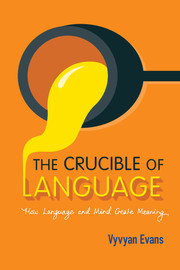Book contents
- Frontmatter
- Dedication
- Epigraph
- Contents
- List of figures
- List of tables
- Preface
- Acknowledgements
- I The ineffability of meaning
- II Meaning in mind
- Chapter 3 Patterns in language, patterns in the mind
- Chapter 4 Time is our fruit fly
- Chapter 5 Concepts body forth
- Chapter 6 The concept-making engine (or how to build a baby)
- Chapter 7 The act of creation
- III Meaning in language
- Epilogue: The golden triangle
- Notes
- References
- Index
Chapter 7 - The act of creation
from II - Meaning in mind
Published online by Cambridge University Press: 05 November 2015
- Frontmatter
- Dedication
- Epigraph
- Contents
- List of figures
- List of tables
- Preface
- Acknowledgements
- I The ineffability of meaning
- II Meaning in mind
- Chapter 3 Patterns in language, patterns in the mind
- Chapter 4 Time is our fruit fly
- Chapter 5 Concepts body forth
- Chapter 6 The concept-making engine (or how to build a baby)
- Chapter 7 The act of creation
- III Meaning in language
- Epilogue: The golden triangle
- Notes
- References
- Index
Summary
In his classic work on creativity, Arthur Koestler recounts the following:
Chamfort tells a story of a Marquis at the court of Louis XIV who, on entering his wife's boudoir and finding her in the arms of a Bishop, walked calmly to the window and went through the motions of blessing the people in the street. ‘What are you doing?’ cried the anguished wife. ‘Monseigneur is performing my functions,’ replied the Marquis, ‘so I am performing his’.
In this story, we might expect the Marquis, upon finding his wife in the arms of another, to react in quite a different way. We might expect anger, jealousy, rage, violence even. But, as Koestler describes, we get something unexpected:
… the tension mounts as the story progresses, but it never reaches its expected climax. The ascending curve is brought to an abrupt end by the Marquis’ unexpected reaction, which debunks our dramatic expectations; it comes like a bolt out of the blue, which, so to speak, decapitates the logical development of the situation. The narrative acted as a channel directing the flow of emotion; when the channel is punctured the emotion gushes out like a liquid through a burst pipe; the tension is suddenly relieved and exploded in laughter.
In his 1964 book, the name of which gives this chapter its title, Koestler explores the process that gives rise to imagination and creativity. The story of the Marquis involves two incompatible frames of reference: those of the celibate priest and of lovers. Yet, in the story, the two frames become interconnected; they become linked despite providing otherwise incommensurable, and even conflicting, contexts. The humour arises precisely because the otherwise clashing frames intersect and inform one another. Koestler argues that this illustrates the process at the heart of the creative act. Creativity arises when an idea intersects in this way with two frames of experience. This process he refers to as ‘bisociation': two distinct frames become linked or integrated in order to create novel meaning.
The commonplace view of creativity is that it is performed by an elite, rather than everyman: it arises from a superior intellect. The literary brilliance of Shakespeare, for instance, or the intellectual feats of Einstein are borne from minds that are somehow removed from the quotidian, arising among the peerless few, hewn from other-worldly material.
Information
- Type
- Chapter
- Information
- The Crucible of LanguageHow Language and Mind Create Meaning, pp. 154 - 190Publisher: Cambridge University PressPrint publication year: 2015
